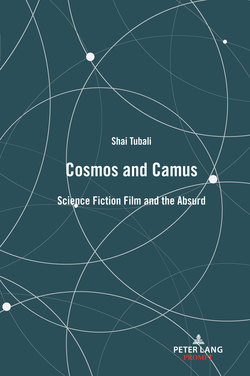Читать книгу Cosmos and Camus - Shai Tubali - Страница 7
На сайте Литреса книга снята с продажи.
ОглавлениеAbout the book
“Existentialism is being re-evaluated across the humanities and its importance for the study of cinema has never been more obvious. Shai Tubali’s timely book offers an interpretation of four science fiction films – Contact, Arrival, A.I. and Her – in terms of Albert Camus’ discussion of the absurd in The Myth of Sisyphus. The work demonstrates the contemporary relevance of Camus’ ideas and presents a fascinating analysis of the films that shows how they interrogate the very limit of being human. In a world where the disjunction between human endeavour and the brute reality of existence has never been more clearly apparent, Tubali offers us a new way of imagining life.”
— Dr David Sorfa, Senior Lecturer in Film Studies,
University of Edinburgh
“This original monograph is a lucid and engaging contribution to both Camus Studies and the philosophy of science fiction. The interpretation of the science fiction films illuminates and expands Camus’ concept of absurdity, thus contributing to our current understanding of what the absurd reality is and how we can either live with it or transcend it. This will become a highly valuable insight in the post-modern years to come.”
— Jacob Golomb, Professor (Emeritus) in Philosophy,
The Hebrew University of Jerusalem,
author of In Search of Authenticity: From Kierkegaard to Camus
Over the last two decades, philosophers have been increasingly inclined to consider science fiction films as philosophical exercises that center on the nature of human consciousness and existence. Albert Camus’ philosophy of the absurd, however, has almost never been employed as a constructive perspective that can reveal unexplored aspects of these films. This is surprising, since science fiction films seem to be packed with visions and dialogues that echo the Sisyphean universe.
Cosmos and Camus endeavors to set foot in this uncharted terrain. Its first part introduces the main components of Camus’ absurdity so that it can be easily applied to the analysis of the films later. Equipped with these Camusean essentials, the book delves into an indepth analysis of two first-encounter films (Contact and Arrival) and two A.I. films (A.I. and Her). These analyses yield more than an insightful reflection of the absurd contents in science fiction film. Indeed, imaginative collisions with nonhumans seem to tell us a lot about the nature of the absurd in the human condition, as well as raising the question of whether absurdity is exclusively a human matter. Ultimately, the interpretation of the films illuminates the films themselves just as much as it illuminates, challenges, and expands Camus’ concept of absurdity.
